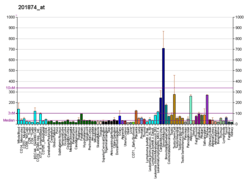MPZL1
Myelin protein zero-like protein 1 is a protein that in humans is encoded by the MPZL1 gene.[5][6]
References
- GRCh38: Ensembl release 89: ENSG00000197965 - Ensembl, May 2017
- GRCm38: Ensembl release 89: ENSMUSG00000026566 - Ensembl, May 2017
- "Human PubMed Reference:". National Center for Biotechnology Information, U.S. National Library of Medicine.
- "Mouse PubMed Reference:". National Center for Biotechnology Information, U.S. National Library of Medicine.
- Zhao ZJ, Zhao R (Dec 1998). "Purification and cloning of PZR, a binding protein and putative physiological substrate of tyrosine phosphatase SHP-2". J Biol Chem. 273 (45): 29367–72. doi:10.1074/jbc.273.45.29367. PMID 9792637.
- "Entrez Gene: MPZL1 myelin protein zero-like 1".
Further reading
- Zhao R, Zhao ZJ (2000). "Dissecting the interaction of SHP-2 with PZR, an immunoglobulin family protein containing immunoreceptor tyrosine-based inhibitory motifs". J. Biol. Chem. 275 (8): 5453–9. doi:10.1074/jbc.275.8.5453. PMID 10681522.
- Zhao R, Guerrah A, Tang H, Zhao ZJ (2002). "Cell surface glycoprotein PZR is a major mediator of concanavalin A-induced cell signaling". J. Biol. Chem. 277 (10): 7882–8. doi:10.1074/jbc.M111914200. PMID 11751924.
- Tang DS, Yu KP, Tang XX, et al. (2000). "Cloning of Human Myelin Protein Zero-like Genes by Bioinformatics Strategy". Sheng Wu Hua Xue Yu Sheng Wu Wu Li Xue Bao Acta Biochimica et Biophysica Sinica. 32 (4): 364–368. PMID 12075424.
- Wistow G, Bernstein SL, Wyatt MK, et al. (2002). "Expressed sequence tag analysis of human RPE/choroid for the NEIBank Project: over 6000 non-redundant transcripts, novel genes and splice variants". Mol. Vis. 8: 205–20. PMID 12107410.
- Zannettino AC, Roubelakis M, Welldon KJ, et al. (2003). "Novel mesenchymal and haematopoietic cell isoforms of the SHP-2 docking receptor, PZR: identification, molecular cloning and effects on cell migration". Biochem. J. 370 (Pt 2): 537–49. doi:10.1042/BJ20020935. PMC 1223174. PMID 12410637.
- Strausberg RL, Feingold EA, Grouse LH, et al. (2003). "Generation and initial analysis of more than 15,000 full-length human and mouse cDNA sequences". Proc. Natl. Acad. Sci. U.S.A. 99 (26): 16899–903. doi:10.1073/pnas.242603899. PMC 139241. PMID 12477932.
- Zhao R, Zhao ZJ (2003). "Identification of a variant form of PZR lacking immunoreceptor tyrosine-based inhibitory motifs". Biochem. Biophys. Res. Commun. 303 (4): 1028–33. doi:10.1016/S0006-291X(03)00484-4. PMID 12684038.
- Clark HF, Gurney AL, Abaya E, et al. (2003). "The secreted protein discovery initiative (SPDI), a large-scale effort to identify novel human secreted and transmembrane proteins: a bioinformatics assessment". Genome Res. 13 (10): 2265–70. doi:10.1101/gr.1293003. PMC 403697. PMID 12975309.
- Lehner B, Sanderson CM (2004). "A protein interaction framework for human mRNA degradation". Genome Res. 14 (7): 1315–23. doi:10.1101/gr.2122004. PMC 442147. PMID 15231747.
- Gerhard DS, Wagner L, Feingold EA, et al. (2004). "The status, quality, and expansion of the NIH full-length cDNA project: the Mammalian Gene Collection (MGC)". Genome Res. 14 (10B): 2121–7. doi:10.1101/gr.2596504. PMC 528928. PMID 15489334.
- Blanchetot C, Chagnon M, Dubé N, et al. (2005). "Substrate-trapping techniques in the identification of cellular PTP targets". Methods. 35 (1): 44–53. doi:10.1016/j.ymeth.2004.07.007. PMID 15588985.
- Rual JF, Venkatesan K, Hao T, et al. (2005). "Towards a proteome-scale map of the human protein-protein interaction network". Nature. 437 (7062): 1173–8. doi:10.1038/nature04209. PMID 16189514.
- Otsuki T, Ota T, Nishikawa T, et al. (2007). "Signal sequence and keyword trap in silico for selection of full-length human cDNAs encoding secretion or membrane proteins from oligo-capped cDNA libraries". DNA Res. 12 (2): 117–26. doi:10.1093/dnares/12.2.117. PMID 16303743.
- He G, Liu X, Qin W, et al. (2006). "MPZL1/PZR, a novel candidate predisposing schizophrenia in Han Chinese". Mol. Psychiatry. 11 (8): 748–51. doi:10.1038/sj.mp.4001841. PMID 16702974.
- Gregory SG, Barlow KF, McLay KE, et al. (2006). "The DNA sequence and biological annotation of human chromosome 1". Nature. 441 (7091): 315–21. doi:10.1038/nature04727. PMID 16710414.
This article is issued from Wikipedia. The text is licensed under Creative Commons - Attribution - Sharealike. Additional terms may apply for the media files.






